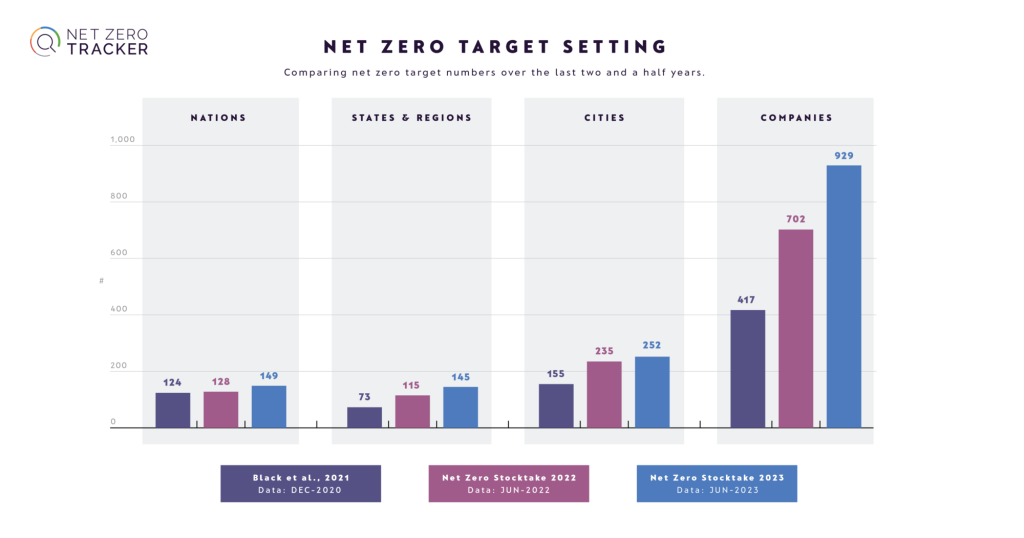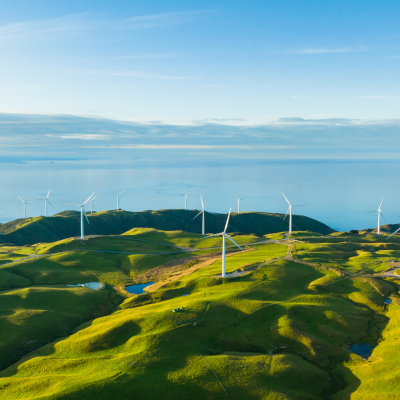In the fight against climate change, countries and corporations have been setting ambitious net-zero targets to reduce greenhouse gas (GHG) emissions. Net zero refers to achieving a balance between the emissions produced and the emissions removed from the atmosphere, effectively reducing the overall carbon footprint. These goals are crucial in mitigating climate change and transitioning to a sustainable, low-carbon future.
The global community has recognized the urgency of addressing climate change and has launched various net zero initiatives to accelerate action and support the transition to a sustainable, low-carbon future. The Paris Agreement (2015) is the landmark of a global initiative aimed at limiting global warming to well below 2°C above pre-industrial levels and pursuing efforts to limit the temperature increase to 1.5°C, and has gained signatory from countries and industries around the world.
The Net Zero Climate Initiative, released the Net Zero Stocktake 2023, a report evaluating the status and trends of net zero target setting across nations, subnational governments, and businesses. The paper emphasizes that over 65% of the top 2000 global corporations’ yearly revenue is now covered by a net zero aim, demonstrating the growing adoption of net zero ambitions. At least 1,475 companies have a net zero target, which is an increase from 769 in December 2020.
Figure 1
Net Zero Target Setting

Source: Net Zero Climate
At the sectoral level, the report found that the Biotech, Health Care & Pharma (44%), Infrastructure (46%), and Retail (26%) sectors have particularly high percentages of companies without any emission reduction target at all. Unsurprisingly, the same three were among the worst performing sectors on net zero target-setting: less than 40% of companies in these sectors have net zero targets, compared with, for example, Power Generation (71%) and Fossil Fuels (67%).
Global Net-Zero Ambition Progress
Numerous governments have committed to ambitious net-zero goals, signaling a shift towards sustainable practices and the decarbonization of their economies. Countries such as the United Kingdom, European Union countries, and New Zealand have set legally binding targets to achieve net-zero emissions by 2050 or earlier. Other countries, including the United States, Japan, and South Korea, have also joined the net-zero movement, pledging to achieve carbon neutrality by 2050. These commitments involve comprehensive strategies that encompass renewable energy deployment, energy efficiency improvements, the electrification of transportation, and the phasing out of fossil fuels.
The European Union (EU) has made significant strides in its net-zero ambition. The EU aims to become climate neutral by 2050 and has established intermediate targets to reduce emissions by at least 55% by 2030. The EU’s commitment to renewable energy deployment, energy efficiency improvements, and the adoption of carbon pricing mechanisms has contributed to its progress.
In 2021, the United States rejoined the Paris Agreement and committed to achieving net-zero emissions by 2050. President Joe Biden’s administration has taken substantial steps towards this goal by implementing ambitious climate policies, including significant investments in clean energy infrastructure, electric vehicle adoption, and the promotion of renewable energy sources.
Figure 2
Net Zero Target Status

Source: Net Zero Climate
Doubling the global pace of energy efficiency progress by 2030 is a key step in efforts to reach net zero emissions. According to The International Energy Agency (IEA), in 2022, the world’s energy efficiency increased by 2.2%, which is twice the average for the previous five years. The energy demand worldwide increased by about 1% in 2022. This would have been roughly three times greater if there had been no improvement in energy efficiency.
Though many efforts are progressively implemented to achieve Net-Zero Emissions globally, further challenges remain ahead. The United Nations High-level Expert Group reports the risk of allowing low-quality net zero pledges and greenwashing to persist is significant, as it can lead to confusion, cynicism, and a failure to take urgent climate action. To address this, regulations will be necessary to establish a level playing field and ensure that ambition is always backed by action. The Expert Group recommends principles to guide non-states entities in setting and attaining their net-zero goals – the plans must be ambitious, have integrity and transparency, and be credible and fair.
Transition plans should include the non-state actor’s commitment to a fair and Just Transition, aiming to establish a Net-Zero and climate-resilient economy while addressing inequality and injustice. According to the IEA, developing economies will require approximately $1 trillion of annual investment in the energy transition to achieve net-zero emissions by the end of this decade. Additionally, to meet the Sustainable Development Goals by 2030, an estimated $3 to $5 trillion of annual investment will be needed. Bridging this gap requires financial institutions and multinational corporations to work with governments, Multilateral Development Banks and Development Finance Institutions, to consistently take more risk and set targets to greatly scale their investments in the clean energy transition in developing countries.
Achieving these net-zero goals will require continued dedication, collaborative efforts, and the deployment of innovative technologies. As we move forward, it is crucial to maintain this momentum and accelerate the transition to a sustainable, low-carbon future.














